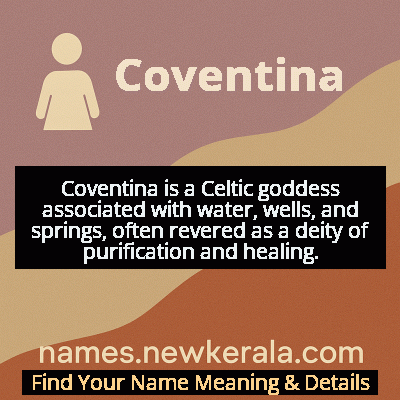Coventina Name Meaning & Details
Origin, Popularity, Numerology Analysis & Name Meaning of Coventina
Discover the origin, meaning, and cultural significance of the name COVENTINA. Delve into its historical roots and explore the lasting impact it has had on communities and traditions.
Name
Coventina
Gender
Female
Origin
Celtic
Lucky Number
4
Meaning of the Name - Coventina
Coventina is a Celtic goddess associated with water, wells, and springs, often revered as a deity of purification and healing.
Coventina - Complete Numerology Analysis
Your Numerology Number
Based on Pythagorean Numerology System
Ruling Planet
Uranus (Rahu)
Positive Nature
Strong sense of order, loyal, practical, and disciplined.
Negative Traits
Stubborn, overly serious, rigid, and prone to feeling restricted.
Lucky Colours
Blue, gray.
Lucky Days
Saturday.
Lucky Stones
Blue sapphire.
Harmony Numbers
1, 7, 8.
Best Suited Professions
Managers, engineers, accountants, organizers.
What People Like About You
Dependability, discipline, practicality.
Famous People Named Coventina
Coventina (Mythological)
Celtic Goddess
Primary water deity worshipped at Carrawburgh along Hadrian's Wall, known for healing springs
Coventina (Literary Character)
Fictional Character
Appears in various fantasy novels as a water spirit or goddess figure
Coventina (Historical Reference)
Archaeological Subject
Subject of numerous archaeological finds including altars and offerings at her sacred spring
Name Variations & International Equivalents
Click on blue names to explore their detailed meanings. Gray names with will be available soon.
Cultural & Historical Significance
The continuity of Coventina's worship from pre-Roman times through the Roman period shows how Celtic spirituality adapted while maintaining core elements. Her association with specific geographical features (springs and wells) reflects the Celtic tradition of locating divinity within the natural landscape. The Roman identification of Coventina with their own nymphs and water deities demonstrates cultural exchange while preserving local religious identity. Today, Coventina's legacy continues in modern pagan revivals and serves as an important example of how archaeological evidence can illuminate ancient religious practices that were largely erased by later Christianization.
Extended Personality Analysis
Those named Coventina typically embody the fluid, adaptive qualities of water itself. They possess remarkable emotional intelligence and intuition, often sensing underlying currents in relationships and situations that others might miss. Like a deep spring, they may appear calm on the surface while containing profound emotional and spiritual depths. Coventinas are natural healers and counselors, drawn to nurturing roles where they can provide emotional support and guidance. Their presence often has a calming, restorative effect on others, much like the soothing quality of flowing water.
Despite their gentle nature, Coventinas possess an underlying strength and persistence reminiscent of water's ability to wear down stone over time. They approach challenges with flexibility and resilience, finding creative solutions by flowing around obstacles rather than confronting them directly. Their emotional depth makes them highly empathetic, but they must guard against becoming overwhelmed by the emotions of others. Coventinas often have a strong connection to nature, particularly water environments, and may find peace and renewal near oceans, rivers, or lakes. They balance sensitivity with practical wisdom, making them both compassionate friends and reliable advisors in times of crisis.
Modern Usage & Popularity
In contemporary naming practices, Coventina occupies a unique niche as a mythological name that combines historical depth with natural spirituality. While extremely rare in mainstream naming charts, it has gained traction among several specific communities: pagan and Wiccan families who honor Celtic deities, parents seeking nature-inspired names with strong feminine energy, and those drawn to unique mythological names outside the Greek and Roman traditions. The name saw a modest increase in usage following the 1990s Celtic revival and the growing popularity of pagan spirituality. It's particularly favored by parents who value names with both aesthetic appeal and meaningful cultural heritage. Coventina's modern usage reflects broader trends toward unique, meaningful names and the revival of ancient spiritual traditions in contemporary contexts. Though it will likely remain uncommon, its distinctive sound and rich symbolism ensure continued interest among naming enthusiasts and spiritual communities.
Symbolic & Spiritual Meanings
Coventina embodies the profound symbolism of water in its most sacred form - as a source of life, healing, and spiritual transformation. She represents the eternal flow of existence, reminding us that change is both constant and natural. Like water that cleanses and renews, Coventina symbolizes emotional and spiritual purification, the washing away of past burdens to begin anew. Her connection to springs specifically highlights the symbolism of hidden sources and unexpected blessings - the idea that life-sustaining power often emerges from unseen depths. Metaphorically, she represents intuition and the subconscious, the deep knowing that flows beneath conscious awareness. Coventina also symbolizes abundance and generosity, as springs provide water freely to all who approach. Her symbolism extends to protection during transitions, much as water facilitates movement between states and places. Ultimately, Coventina represents the sacred feminine principle of nurturing power - strong yet gentle, life-giving yet mysterious, always flowing toward greater wholeness and connection.

